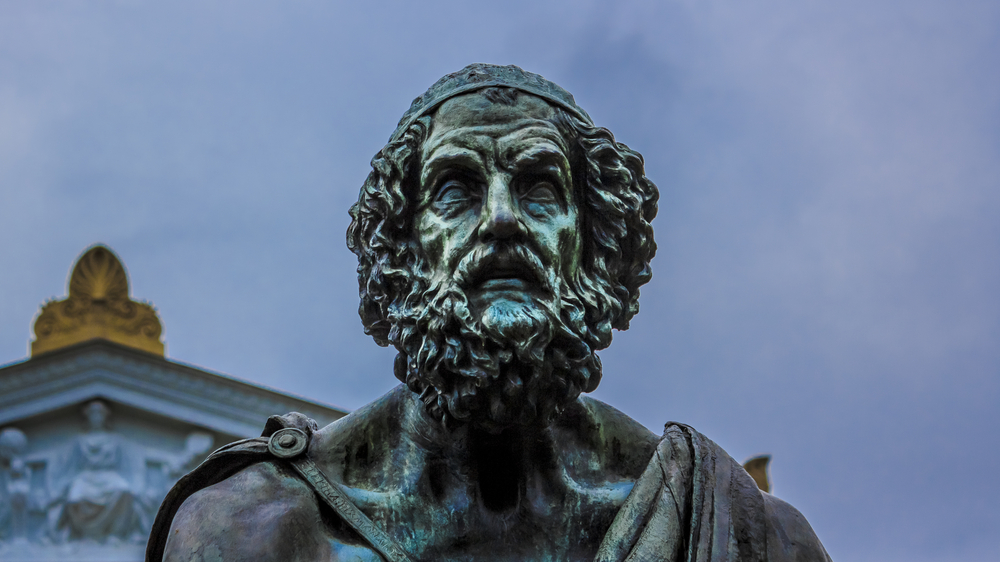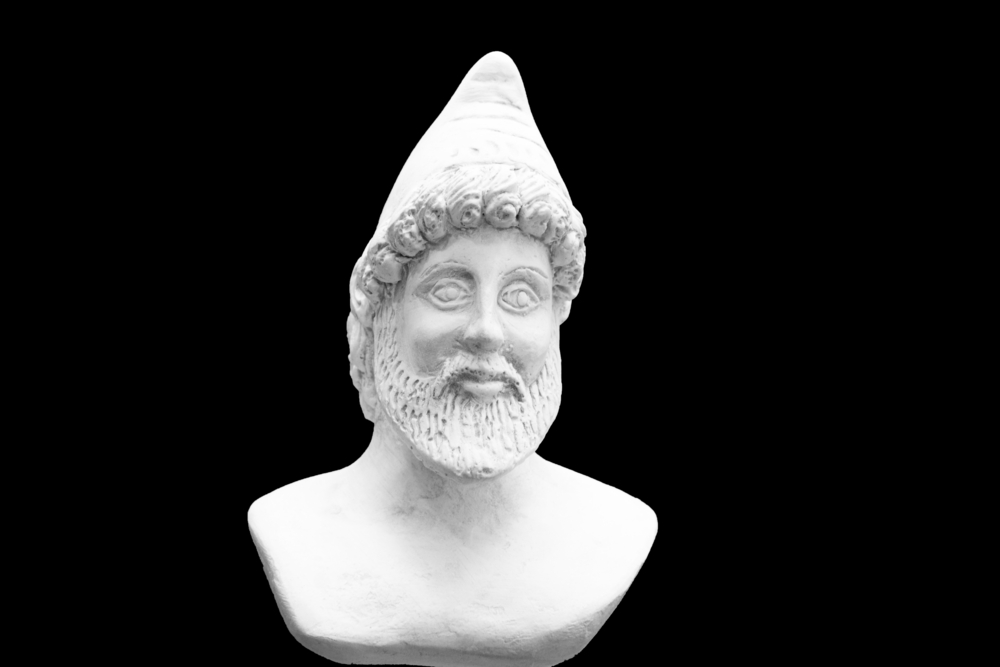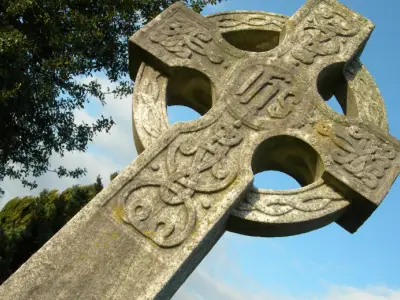The Odyssey, penned by the legendary poet Homer, is a powerful narrative that has captivated audiences for thousands of years. If you're keen to dive into a world of adventure, heroics, and the nuances of human nature, The Odyssey is a compelling choice. Whether you are a student, a lover of classic literature, or just someone curious about Greek mythology, this timeless epic offers something for everyone. Let's explore the key elements of this remarkable story.
Jump to:
What is The Odyssey?

The Odyssey is an ancient Greek epic poem, attributed to the poet Homer. Often paired with Homer's other great work, The Iliad, this poem tells the story of Odysseus, king of Ithaca, and his tumultuous journey home after the fall of Troy. It's a tale rich with encounters with monstrous creatures, divine interventions, and the enduring human spirit. This narrative offers insights into the culture and values of ancient Greece.
When Was The Odyssey Written?
Scholars estimate that The Odyssey was composed near the end of the 8th century BC. This period was a time of heroes and myths, which Homer skilfully weaves into a narrative that has survived the test of time, influencing countless other pieces of literature.
Recommended for you!
Best SellersThe Main Characters of The Odyssey

In Homer's epic, "The Odyssey," the narrative is woven with complex characters, each adding depth and dimension to the story. Let’s learn more about these central figures whose traits and decisions are key to the unfolding of this timeless saga.
Odysseus: The Complex Hero
At the heart of "The Odyssey" stands its protagonist, Odysseus, often hailed as "Odysseus the Cunning." His intellect and adaptability are his greatest assets, allowing him to navigate the trials that obstruct his path home.
Yet, these traits are double-edged. Odysseus's cleverness often veers into deceit and trickery, reflecting ancient Greek values that prized wit over brute strength. However, his pride and overconfidence sometimes escalate his challenges, drawing out his journey and complicating his relationships with gods and men. This duality makes Odysseus a relatable hero, flawed yet fundamentally striving for good.
Penelope: The Faithful Wife
Penelope, Odysseus's wife, represents loyalty and wit. In an era when women were often sidelined, she stands out as a central figure, managing the household and fending off numerous suitors who presume Odysseus dead.
Penelope is dynamic and clever, employing tactics such as the weaving of a shroud that she unravels each night to delay choosing a new husband. Her steadfastness and cunning protect her family's estate and preserve her husband's kingdom, making her an unsung hero of the epic.
Telemachus: The Loyal Son
Telemachus, the son of Odysseus and Penelope, is involved in a parallel journey of self-discovery and growth. Initially depicted as somewhat helpless and indecisive, under the guidance of Athena, he matures significantly throughout the narrative.
His transformation from a boy into a man capable of ruling Ithaca and confronting the suitors is symbolic of the journey from adolescence to adulthood. Telemachus's development is important, reflecting the epic’s broader themes of personal growth and the quest for identity.
The Suitors: The Antagonists
The suitors in "The Odyssey," who invade Odysseus's palace to vie for Penelope’s hand, are societal disruptors. They abuse the Greek custom of hospitality, squander Odysseus’s wealth, and threaten the stability of Ithaca. Their presence and actions serve as a critique of societal decay and moral degradation.
The resolution of this conflict through their eventual defeat by Odysseus, who is assisted by his son, restores both his rule and order to Ithaca.
A Summary of The Odyssey Story
This section delves into the epic's rich narrative, revealing how each adventure and encounter shapes the themes of identity, perseverance, and the human spirit.
A Journey of Trials and Tribulations
The central story of The Odyssey follows Odysseus, the clever and resourceful king of Ithaca, as he attempts to return home after the epic Trojan War. Unlike The Iliad, which focuses on the events of the war itself, The Odyssey takes a broader look at the challenges of returning to everyday life after such a conflict.
Odysseus's journey spans ten years, during which he faces numerous obstacles. Each episode or adventure presents its own set of challenges that test Odysseus's wit, patience, and endurance. From the hypnotic allure of the Sirens' song to the ferocity of the sea god Poseidon, each encounter is steeped in symbolic meaning that speaks to the broader themes of the epic—identity, perseverance, and the impact of one's choices on their destiny.
Encounters with Mythical Creatures
One of the most captivating aspects of The Odyssey is its host of monstrous and mythical creatures. Odysseus encounters the Cyclops Polyphemus, a one-eyed giant who poses a brutal challenge; Circe, the enchantress who turns men into swine; and the lotus-eaters, who offer his crew fruit that causes them to forget their homecoming. These encounters are moral and ethical tests that reveal the character of Odysseus and his crew.
Divine Interventions and the Role of the Gods
The gods play an important role in The Odyssey, reflecting the ancient Greek belief in divine influence over human affairs. Athena, the goddess of wisdom, takes a special interest in Odysseus, helping him with her wisdom throughout his travels. Poseidon harbours a grudge against Odysseus for blinding his son, Polyphemus, and continually hampers his journey home.
Insights into Ancient Greek Culture
The Odyssey offers a window into the values and culture of ancient Greece. Themes of hospitality, loyalty, and the proper treatment of guests and hosts (xenia) recur throughout the poem, highlighting the social and moral expectations of the time. The importance of family and home, the value placed on cunning and intelligence, and the interactions between the mortal and divine are all integral to understanding the ancient Greek worldview.
A Tale of the Enduring Human Spirit
Ultimately, The Odyssey celebrates the human spirit’s resilience. Odysseus’s journey home is fraught with setbacks and heartbreaks, yet his unwavering determination to return to his wife, Penelope, and his son, Telemachus, speaks to the enduring power of love and commitment. This inspiring epic offers timeless lessons on overcoming adversity through perseverance and ingenuity.
Central Themes in The Odyssey

The Odyssey is both an adventure story and a powerful exploration of themes that resonate deeply with the human condition. Each theme is intricately woven into the narrative, providing insights into the complexities of life and the challenges we all face.
The Struggle for Home and Identity
Home in The Odyssey represents peace, stability, and identity. For Odysseus, the journey home is fraught with obstacles that test his resolve, cunning, and endurance, but it's also a voyage of self-discovery. Each challenge and encounter serves as a mirror reflecting his deepest fears, desires, and values, compelling him to confront his own character and purpose. The longing for home thus becomes a powerful narrative driving force, illustrating the deep human need for belonging and self-realisation.
Hospitality as A Sacred Law
The concept of xenia, or hospitality, is important in The Odyssey and reflects a fundamental aspect of ancient Greek culture. This sacred law dictates the mutual respect and generosity you must show to strangers and guests, a societal norm that gods and mortals are expected to uphold. Odysseus's various encounters—ranging from the warm reception by King Alcinous to the dangerous hospitality of the Cyclops—highlight the potential consequences of honouring or violating this sacred duty.
The Power of Cunning Over Strength
Throughout his journey, Odysseus encounters situations where physical strength alone is inadequate to ensure his survival or success. Instead, he frequently relies on his mental agility and cunning to navigate challenges and overcome adversaries. This theme challenges the traditional heroic ideal that valorises brute strength, suggesting instead that intellect and cleverness are equally, if not more, important attributes. This preference for wit over might also reflects the Greek admiration for strategy, which are seen as crucial traits for leadership and success.
The Odyssey as a Metaphor for Life
Perhaps one of the most enduring aspects of The Odyssey is its role as a metaphor for life's journey. Just as Odysseus navigates the unpredictable waters of the Mediterranean, humans navigate the uncertain seas of their lives, facing trials and challenges that test their resilience and shape their identities. The epic encapsulates the idea that life is an odyssey filled with unknowns, where each experience, whether joyous or tragic, contributes to your growth and understanding of the world.
Frequently Asked Questions About The Odyssey
How Hard is It to Read The Odyssey?
Reading The Odyssey can be challenging due to its ancient Greek origins and epic poetic format. However, numerous translations and adaptations make it more accessible for modern readers. The narrative structure, filled with engaging adventures and insights, compensates for the initial challenge, making it a rewarding experience.
Is Odysseus a Hero or Villain?
Odysseus is often seen as a hero, embodying the ideals of cunning, intelligence, and resilience. However, his actions, particularly his deceptive tactics, can sometimes cast him in a morally ambiguous light. This complexity makes him one of the most interesting and relatable characters in literature.
Why Is The Odyssey a Must-Read?
The Odyssey offers deep insights into human nature and ancient Greek culture. Its themes of adventure, identity, and homecoming resonate universally, making it relevant even today.
What is the Most Famous Story in The Odyssey?
One of the most famous stories from The Odyssey is the encounter with the Cyclops, Polyphemus. This tale of cunning over brute force encapsulates the cleverness of Odysseus and is often highlighted for its thematic depth and excitement.
Can a 13-Year-Old Read The Odyssey?
A 13-year-old can read The Odyssey, especially in versions that are adapted for younger readers. These adaptations preserve the core stories and themes while making the language and content more accessible.
What Do I Need to Know Before Reading The Odyssey?
It's helpful to have a basic understanding of Greek mythology and the Trojan War context, as The Odyssey is a sequel to The Iliad. Knowing the major gods and goddesses, as well as the key heroes of Greek mythology, can enhance your understanding and enjoyment of the epic.
What is Odysseus's Fatal Flaw?
Odysseus's fatal flaw is often considered to be his hubris or excessive pride. This trait leads him to make reckless decisions, such as taunting the Cyclops, which results in severe consequences.
What is Odysseus's Weakness?
Apart from his hubris, Odysseus’s other notable weakness is his occasional lapse in judgment regarding loyalty and his responsibilities, which prolongs his journey and endangers his crew.
Why Was Odysseus Cursed?
Odysseus was cursed by Poseidon after he blinded Poseidon's son, Polyphemus the Cyclops. This act of defiance angered the god of the sea, who then made Odysseus's journey home exceedingly difficult.
What are the Three Biggest Life Lessons from The Odyssey?
- Wisdom Over Strength: The importance of intellect and cunning over sheer physical power.
- Resilience: The value of perseverance through adversity.
- Hospitality: The significance of xenia (hospitality), a major ancient Greek value, is emphasised throughout the epic.
How is The Odyssey a Metaphor for Life?
The Odyssey symbolises life's journey, filled with challenges and growth opportunities. Each adventure teaches something valuable, reflecting our own personal and spiritual journeys.
Why Did Poseidon Hate Odysseus?
Poseidon hated Odysseus for blinding his son, Polyphemus, and because Odysseus often displayed arrogance towards the gods, which was considered highly offensive.
What Did Odysseus Do to Circe?
Odysseus resisted Circe's magical powers, which she used to turn his men into swine. With the help of the god Hermes, he was able to overcome Circe, who then became his ally and lover for a year.
Why is Odysseus Called Ulysses?
Ulysses is the Roman name for Odysseus, used in many Latin or English translations of The Odyssey. The shift reflects the adaptation of Greek stories into Roman culture.
How Does The Odyssey End?
The Odyssey ends with Odysseus reclaiming his throne and reuniting with his family in Ithaca. After dealing with the suitors, he establishes peace and resumes his rightful place as king, bringing the epic to a fulfilling conclusion.
How Long Does it Take the Average Person to Read The Odyssey?
The time it takes to read The Odyssey can vary widely based on the translation and the reader's engagement with the text. On average, it might take anywhere from several days to a few weeks to thoroughly enjoy and absorb the epic.
What is the Moral Lesson of The Odyssey?
There are many moral lessons in The Odyssey, but one of the central takeaways is the importance of perseverance. Odysseus's relentless effort to return home teaches us about the value of determination and the strength of the human spirit in overcoming adversity.
Recommended for you!
Best SellersDiscover Greek Mythology with Centre of Excellence
Immerse yourself in tales of gods, heroes, and the powerful truths hidden within ancient myths with our Greek Mythology Diploma Course, designed to deepen your understanding and appreciation of this fascinating subject.
Why Centre of Excellence?
- Accessibility: We believe passionately in making transformative education available to all. That’s why we offer our Greek Mythology Diploma Course at an affordable rate, ensuring everyone has the opportunity to explore these timeless stories.
- Flexibility: Our courses are structured to blend seamlessly into your life. Whether you're learning for pleasure or professional development, you can progress at your own pace and schedule, making it easier than ever to enrich your knowledge without disrupting your daily routine.
- Dedicated Support: Every enrolment includes personalised tutor support and membership in an active community of fellow enthusiasts. You’re joining a supportive network of learners who share your passion for Greek mythology.
Special Invitation
We are thrilled to invite you to enrol in our Greek Mythology Diploma Course at a special price of only £29, saving you over £100!













